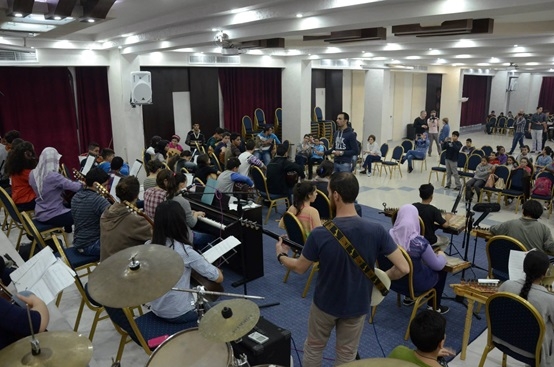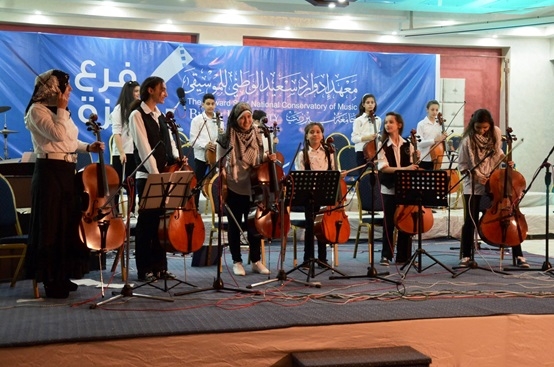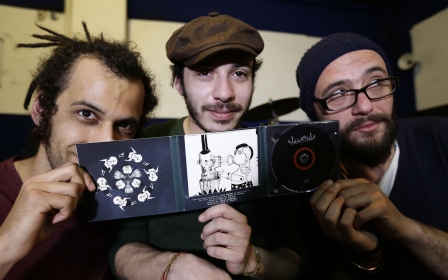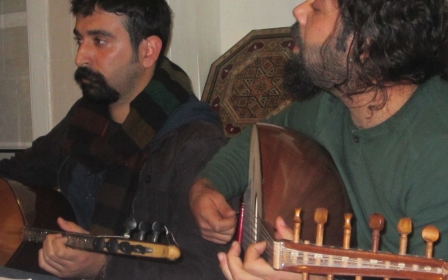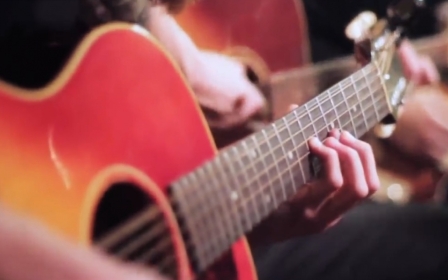Young musicians hone their skills at Gaza’s only music school
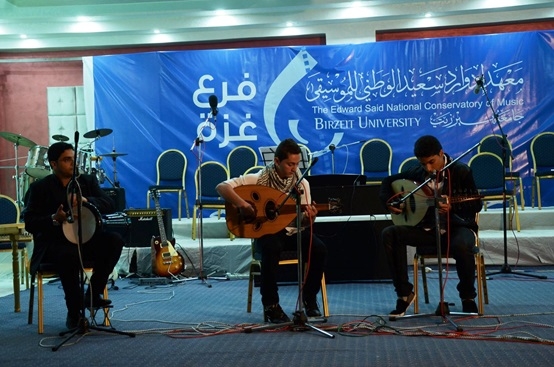
GAZA CITY - With youthful innocence radiating across his face, 15-year-old Alaa al-Aff gently plucks the strings of the lute he embraces in a hall in Gaza’s only music school. The melodies and tunes that erupt as he begins to play breach the silence and temporarily shatter the memories of the eight-year-long Israeli siege on the tiny Palestinian territory. As he plays his instrument, Alaa tries to forget the pains of three wars that have paralysed his life and the life of all those in the Gaza Strip.
Scores of children between the ages of seven to 15 years old play a combination of musical instruments largely provided by the Edward Said National Conservatory of Music which is based in Ramallah. The school is the Gazan branch of the Edward Said Conservatory and is located in Gaza's Tel al-Hawa district. The conservatory provides a range of musical instruments: Eastern instruments such as the lute, ney, oboe, tabla, and Western instruments like the piano, guitar, violin, cello, viola, saxophone and trumpet.
Through their music, the school's students renew one another’s hope that, in spite of all they have endured, the children of Gaza are still raising their voices through melody, to let the world know that they are still calling for freedom and peace.
As Alaa prepares himself for a new lesson he says: "My love of all things musical is what urged me to join the music school. I used to really love watching music shows on TV and now I really love playing the lute."
Alaa began his journey into the music world three years ago. He reached advanced standards in a very short time, winning the admiration of his teachers and fellow students. As his skills developed, his passion - specifically for the tones and notes unique to the lute - grew as well.
His love of music is one of his key motivations to one day leave the besieged Gaza Strip. He dreams of studying music abroad and even competing in international competitions. Recently, he ranked third in an internal Palestinian competition and wants to see how he fares overseas.
During the first year of the school's existence, its lone building was bombarded by Israeli F-16 warplanes during Israel's war, Operation Cast Lead in 2008-2009. The damage was so extensive that the institute was forced to relocate to a new building.
Israeli aggression also indirectly targeted the school once again during the war in the summer of 2014. As Israeli bombs struck nearby, the impact was so severe that the windows shattered and the walls cracked.
The school's headmaster, Ibrahim al-Najjar, says that 180 students, boys and girls, are taught by instructors with certificates in music studies. Some of them are expatriates from Russia, Romania and other countries. They have all studied music in institutions throughout the world.
The number of females enrolled in the school surpasses that of males by far, perhaps due to the nature of a culture that encourages boys to participate in sports over the arts. The school is comprised of 10 small halls in addition to a single large hall where the more theoretical material is taught. It also serves as a large rehearsal space and a venue for events and celebrations.
The school's programme is intense, with students studying for eight years, not including one preparatory year. In the first four years, students acquire a primary certificate. In the following four years, they receive an intermediate certificate, and can go on to earn higher degrees through academic coursework.
Overcoming the odds
Naeem al-Maqadma, a student at the school, had his home destroyed by the latest Israeli aggression on Gaza in 2014. He could not save his musical instruments as everything inside the house was ravaged. Al-Maqadma explained: "My educational standard at the school took a huge blow, but thanks to the help of my teachers, I have been able, through compensatory lessons, to get back to my pre-war standard."
Roaming the corridors of the school, you can hear music reverberating everywhere, almost transporting you to another world, away from the noise of troubled life in the ill-fated city besieged for years.
Maqadma regularly attends the weekly lessons at school, in spite of living in a rented house and waiting for his house to be rebuilt; the reconstruction process may take years under the current political circumstances. The school provided a replacement lute similar to Maqadma's original, which was destroyed when the family's home was shelled.
Gaza and music
Ismaeel Dawood, a music instructor at the school, has frequently complained of the lack of public interest in the musical arts, which he attributed to a combination of economic-political and social problems. Music in Gaza suffers from lack of interest by institutes and universities, due, in part, to a shortage of academic staff in the field. The case in the West Bank is different - there is accelerated growth and interest in music emerging there.
Concerts are well received though, considering the stressful atmosphere in which Gazans live. Najjar says there has been no real opposition to their work or the festivals they have hosted since the inception of the school, neither from individuals nor the relatively conservative Islamic government, Hamas.
Talent is the basis
Lute teacher Ismaeel Dawood told Middle East Eye: "Children wishing to learn music at school naturally have the capabilities to learn. There are a considerable number of Gazan children who have musical talent,” he added. "But the economic conditions have deprived many of the opportunity to join the school. This is the case, although tuition fees collected by the institute are relatively little compared with those collected by institutes in the West Bank."
Students at the Gaza music conservatory pay annual fees of 400 shekels, an equivalent of $100. Whereas in the West Bank, students must pay 4,000 shekels, an equivalent of $1,000, according to Dawood. Prices of musical instruments in Gaza remain relatively low, compared with those in surrounding countries and in the West Bank.
Growing pains
While interest in the school's programme increases and the list of prospective students swells, limited space inside the school is a prominent impediment to growth. In order to make more space available, the number of halls would need to be increased, says Dawood. If the budget allowed for such growth, then both the number of students and teachers at the school would increase. But the ground on which the school stands is leased, and not actually owned by the school, making expansion problematic.
The permanent problem in Gaza is manifested in the Israeli siege that blocks the arrival of equipment to Gaza, in addition to the inability to exchange expertise and network with other countries and within the Palestinian territories. Dawood told MEE that last year the school received invitations to take part in festivals, seminars and workshops in several countries such as Tunisia, Morocco, Italy and Egypt, but the Israeli restrictions on freedom of movement to and from Gaza deprived the school staff from direct participation.
School achievements
One of the most prominent achievements the institute has earned is the honour of its students participating in the "Arabs Got Talent" contest based in Lebanon and broadcast all over the Arab World. Moreover, a large number of students have participated in local and international contests, climbing their way up to advanced ranks.
The school, through its academic programmes, has fostered the talent of hundreds of children for years, promoting their abilities and qualifying them to further their college education. They have also had the rare opportunity to be instructed by international musicians and instructors and to have a cross-cultural experience in Gaza, a place that is closed off from the rest of the world.
Middle East Eye propose une couverture et une analyse indépendantes et incomparables du Moyen-Orient, de l’Afrique du Nord et d’autres régions du monde. Pour en savoir plus sur la reprise de ce contenu et les frais qui s’appliquent, veuillez remplir ce formulaire [en anglais]. Pour en savoir plus sur MEE, cliquez ici [en anglais].


